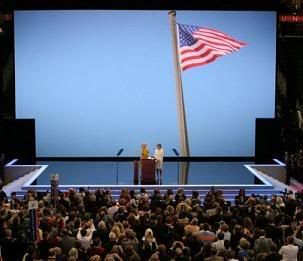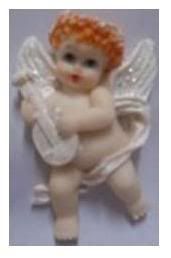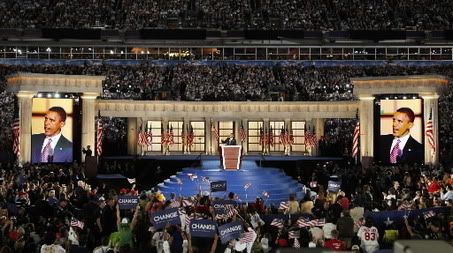(10 am. – promoted by ek hornbeck)
Can an entire political party be kitsch?
This year’s Republican National Convention seemed determined to find out. From the projected image of an American flag (complete with pole) on a giant powerpoint screen during a ceremony in which real veterans carried a real flag to the front of the convention hall, to the Thursday night viewing of 9/11 footage during which the towers fell to the strains of sentimental music and a voice-over insisting that we never forget, the 2008 Republican convention was a kitsch-o-rama of epic proportions.
If veterans with flags get some patriotic pride flowing, then a fifty-foot projection of a flag would – of course! — generate even more. If a few homemade signs generate some enthusiasm, then mass-produced “Palin Power” signs printed in a fingerpaint font are so much the better. Subtlety and authenticity are not watchwords for kitsch. Above all, irony is not allowed; a cracked smile at the overwrought appeals is to be condemned.
But let’s pause for a moment to talk about kitsch more generally.
Kitsch — the aesthetic, emotional, and moral fakery that typifies some forms of, for lack of a better phrase, really bad art — is not the same as camp, and ought not be confused with it. Camp works to the extent that the viewer knows it is camp, takes it as camp. Kitsch “works,” if that is the word, only to the extent that the audience takes it at face value. Refrigerator magnets in the shape of baby angels are kitsch. When we speak of their “kitsch-value”, we are speaking of their value as camp. We put the magnet up as a joke, or anyway with a sense of irony. We enjoy the fact that the baby-angel magnet is going for “heartwarming” . . . and is failing spectacularly. Kitsch can be campified, but is once it is, it is no longer kitsch. The last episode of M*A*S*H is kitsch. John Waters’s film “Pink Flamingoes” is camp.
Kitsch cheapens and coarsens the sensibilities of the viewer or reader. By getting the audience to mold its expectations of artwork to the unearned resolution, to the quick-and-suspect romance, to the clichéd source of pride, kitsch blinds the audience the difference between the fake and the real thing. People drenched in kitsch begin to lose the ability to see the real moral quandary, faithfully portrayed, and the real and hard-earned virtues which help us, sometimes, to overcome them. Kitsch art does not portray bravery and temperance but “bravery” and “temperance” — on-demand reproductions and foreshortened clichés. Reverence is ditched for instant supplication. Love is unknown here, but infatuation is sometimes called by its name.
When everything is painted in a Thomas Kinkaid light, the genuine article becomes very hard to discern. That is a side-effect of cynically mass-producing “heart-tugging” art. On the other hand, it is the very goal of, most especially, political kitsch.
Political kitsch must be total. In order for a totalizing kitsch to work, there must not be anyone around to point out the joke, to snicker knowingly at the pretense. There must not be any non-Kinkaidian spotlight around. It’s here that the deeper connection between authoritarianism and kitsch can be found.
In a healthy democracy, there is never only one voice, nor does the populace want for there to be one. But in a degenerate democracy, there may be an overdub to the body politic. A voice-over to instruct the electorate on the correct interpretation of everything. “This is funny, this is contemplative, this is dramatic . . . and this is a cause for war.”
[Ominous/sentimental music]
The first attack occurred in Iran, four-hundred and forty-four days, America held hostage. Then again, and again. At our embassies, our navy. They grew ever more bold. Their call was, “On those who believe in God, and hopes for reward, to obey God’s command to kill Americans.” And kill us they did, this time on American soil. The date was September eleventh. Nine-eleven. This enemy sworn to our destruction has been at war with us for decades. This we now know. Jihadists are still intent on attacking civilization. Freedom. The very soul of America. It was a war we never chose to fight, and for too long we’ve looked the other way. But the enemy is wrong; this is a war America will win. We’ll have a President who knows how.
[Subtle shift to hopeful/sentimental music]
We remember where we were that day, what happened, what we were doing, how our lives changed. We remember buildings burning. Bodies falling. So many stories of bravery. We remember. We will carry memories of your beautiful faces and those loving voices now gone forever. And we will never let it happen again.
I submit that the word “your” in the second-to-last sentence (as I’ve transcribed it) is the apotheosis of authoritarian kitsch. It occurs over footage of family members laying flowers at a memorial. Shortly after, we see a piece of paper with black-and-white photographs of the dead – a piece of paper marred by splashes of red.
That word “your” up there, occurring as it does during a convention intended to get votes for a political candidate, would get and ought to get nothing but mockery or “how dare you” in return, from the citizens of a healthy democracy.
There is still more going on here, though. Roger Scruton wrote, in a 1999 article titled “Kitsch and the Modern Predicament“:
Kitsch is pretense. But not all pretense is kitsch. Something else is needed to create the sense of intrusion-the un-wanted hand on the knee. Kitsch is not just pretending; it is asking you to join in the game. In real kitsch, what is being faked cannot be faked. Hence the pretense must be mutual, complicitous, knowing. The opposite of kitsch is not sophistication but innocence. Kitsch art is pretending to express something, and you, in accepting it, are pretending to feel.
Kitsch therefore relies on codes and clichés that convert the higher emotions into a pre-digested and trouble-free form-the form that can be most easily pretended. Like processed food, kitsch avoids everything in the organism that asks for moral energy and so passes from junk to crap without an intervening spell of nourishment.
If Scruton is correct, here, then the people who watch the RNC 9/11 video and react with a feeling of “grief” “patriotism” and “vengeance” are in some sense playing along. They know, somewhere inside themselves, that what they are seeing is bullshit. But they see a return on allowing themselves to tricked. What return? Milan Kundera offers a clue:
Kitsch causes two tears to flow in quick succession. The first tear says: How nice to see children running on the grass! The second tear says: How nice to be moved, together with all mankind, by children running on the grass! It is the second tear that makes kitsch kitsch.
Replace “all mankind” with “all the members of my political party” and we getting to the heart of authoritarian kitsch. It is fake sentiment bolstered by a sense of belonging.
______________________
But let us put some brakes on for a moment.
A little self-reflection is in order.
Any discussion of kitsch in the 2008 conventions must include, of course, Barack Obama’s Greek pillars.
Is that kitsch? Obviously. Does it call to mind Washington D.C.? Again, of course. Washington D.C. is itself kitsch: an attempt to purchase the wisdom of the Greeks for the cost of a few buildings. Obama is here adopting the pretense.
Right-wing commentators have mocked Obama at the pillars, calling the venue the “Barackapolis” and Obama “the One.” Such mockery is entirely in order, in response to such a visual. But we can also ask: Does Obama really think he is a god? Does he actually want viewers to go along with some idea that he is as wise as Aristotle, as brave as King Leonidas of Sparta? Probably not. Just a guess.
On the other hand, is McCain asking for some similar ironic distance from that 9/11 video? Or is he asking for a totalizing – if not belief, then at least pretense of belief – that he represents faith to, and vengeance for, “those beautiful faces”? I will leave it to the reader to decide whether Obama meant those pillars as earnestly as McCain meant the video.




17 comments
Skip to comment form
Author
Also at DailyKos.
Symbolism is everything.
republican for bullshit? As in “Can an entire political party be…”?
obama should probably have stood in front of a picture of a school he never attended, nor had any ties to… 😉
there were other discussions regarding the rnc about how exclusionary and derogatory the messages were…so im thinking maybe the kitsch is part of a self-definition that the generic ‘republican’ wants to think he/she projects to the world. that’s much simpler than actually living your principles. well…their adopted, group-identity principles, anyway. my personal principles arent too hard to live by at all 😉
so they create the kitschy group identity, and are free to associate themselves with it, and claim its values as their own, without having to actually live it ??
you’ve just helped unpack something much bigger for me than what happened at the RNC.
My right wing fundamentalist family lives in kitsch 24/7. The easiest way for me to describe it is in their attachment to a tv show like “Touched by an Angel”…manufactured kitsch. They revel in stuff like that, tearing up at the “beautiful endings.” And since it makes me want to gag, they think I’m hard-hearted and unfeeling. Its been a tension I feel for years now and am always trying to understand.
You also remind me that I heard Cornell West speak on tv once about the danger of the left being cynicism and the right being sentimentalism. I think the later is another way of talking about kitsch.
description. Obama should take off the flag pin now.
for the Republican party’s appeal has no foundation other then kitchey patriotism and nationalism. The America they project like the Kinkaid paintings does not exist never did. Even Rockwell’s kitchey vision of America had more substance then the GOP’s.
I don’t however understand the death and torture love part. How do they reconcile sentimental patriotism and torture or killing with faux handwriting of children, with family? McCain’s speech the POW part was so creepy, it’s hard to understand how the rank and file can call this hero. Palin’s imagery of a pit bull with lipstick and barracudas does not give me the warm feeling of safety or admiration for her motherhood. Yet in the interviews with the delegates ‘He will keep us safe’ was the reason given most for McCain. Perhaps the definition of safety is in their minds protecting the America they have cooked up, the sick dream of a land that does not exist or does it?
“kitsch” explains so very much, LC! seriously great essay. much thanks.
short snip in return: a confirmed fridge magnet collector, this last move sort of wiped me out, so the front of this fridge only has a red guitar from Graceland and Betty Boop right beside it. (me and hub) the Peace magnet holds a list that we’ll never finish. only about half of the rest of the gallizions of magnets found a home on the side.
Guitar and Betty are camp. Peace is on a rock (solid). Sweatshirts with the American Flag are kitsch.
it just all makes so much sense, now. and perfectly explains why i HATED the movie “Forrest Gump” and why that shocked some members of my family.
http://www.newamericancentury….
It does appear that the celebrations of the anti-New World Order set have been premature.